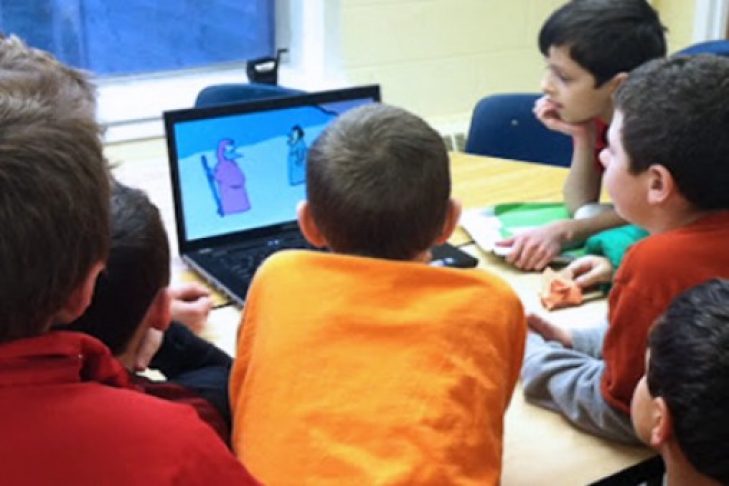“I know I’m still not completely over my cold but I can’t miss school this afternoon. My group is finishing up our part of the siddur project and I can’t let them down.”
“’How is Hebrew school this year? Do you like it?’” I asked my son. He replied, ‘No, Mommy.’ As my heart skipped a beat, he said, ‘I don’t like it, I love it!’”
These are examples of actual comments we hear in 2016 from students in part-time Jewish education programs in Greater Boston. Since 2011, Jewish Learning Connections (JLC), an initiative of Combined Jewish Philanthropies, has been working to change the narrative in the community from “I hate Hebrew School” and “Do I have to go?” to comments like the ones above. Jewish Learning Connections develops and implements a variety of strategies to help part-time schools transform the Jewish learning they offer children and their families. Our ultimate goal is more Jewishly empowered and engaged children and families. With 80% of Jewish children in Greater Boston and nationwide enrolled in part-time Jewish education programs, achieving this goal would be particularly impactful.
With the support of the Experiment in Congregational Education (ECE) of the Hebrew Union College-Jewish Institute of Religion, Jewish Learning Connections takes a unique approach to help congregations transform their learning programs. Our core support mechanism for congregations participating in the initiative is ongoing and time-intensive consultation. A small financial incentive for the congregation is often also included. Consultants work closely with congregations as they articulate learning design principles that then support experimentation with pedagogical innovations. Four principles have emerged as core to meaningful and successful educational innovations: learning that is active, life-centered, relationship and rich in content. In the series of weekly posts that will follow this one, you will read how four very different congregations have made these principles come alive in new ways.
JLC does not dictate the types of innovation or pedagogic models congregations develop or adopt. We recognize that each congregation is different and has its own culture. JLC consultants customize their approach based on each congregation’s needs, interests, and readiness. Some of our pilot sites began small, innovating with a grade or two, and then spread the innovation to include all of the elementary grades or the entire school. Other congregations created an entirely new vision of learning over a multi-year process and then re-opened with a completely re-imagined learning program. One of our key learnings is that change from the top down (vision-driven) and bottom-up (beginning with programmatic changes) can be equally effective in creating systemic change in a congregation. “Through JLC, CJP and the Boston community have taken a unique, customized approach to congregational educational innovation that has yielded powerful results by focusing on pedagogical innovation and aligning the whole system to it, by supporting each congregation on its own path, and building innovative capability right here in Boston,” says Dr. Rob Weinberg, National Director of the ECE.
Strong partnerships are vital to our work. We partner with congregations, certainly in a financial sense but, even more importantly, as thought partners. The community of practice JLC coordinates with the educators of our pilot sites is a place where we reflect on the work, celebrate successes and learn from one another. This open and transparent framework allows all involved to learn from challenges and failures as well as from successes. We also established a similar community of practice for the JLC consultants, staffed and led by our HUC-JIR ECE partners, as a space for them also to reflect, learn and share successes and challenges.
JLC believes that there is not just one path to innovation and change. Therefore, we also partner with local organizations in our area such as Gateways: Access for Jewish Education and Hebrew College, both helping us to deliver varied and robust professional development opportunities. Creating excellent teachers and educators in the areas of special needs, technology and new pedagogies are all key aspects of a revitalized system of part-time Jewish education.
We are proud of the innovative models that we’ve helped develop and nurture in our community. As we move from Pesach to Shavuot, counting the days and weeks to the giving of Torah at Mt. Sinai, CJP’s Jewish Learning Connections is pleased to offer a series of weekly blog posts from educators at four of our pilot sites. Through their reflections, you will learn about the impact that project-based/expeditionary learning, relationship and story-based learning, and arts-based learning are having on the lives of Jewish children and families in our Greater Boston community. When young people won’t skip a day even when sick, and they say “I don’t like Hebrew School, I love it,” we know we are making a difference. Early evaluation research confirms that we are indeed moving the needle in part-time Jewish learning in the Boston community.
This post has been contributed by a third party. The opinions, facts and any media content are presented solely by the author, and JewishBoston assumes no responsibility for them. Want to add your voice to the conversation? Publish your own post here. MORE

